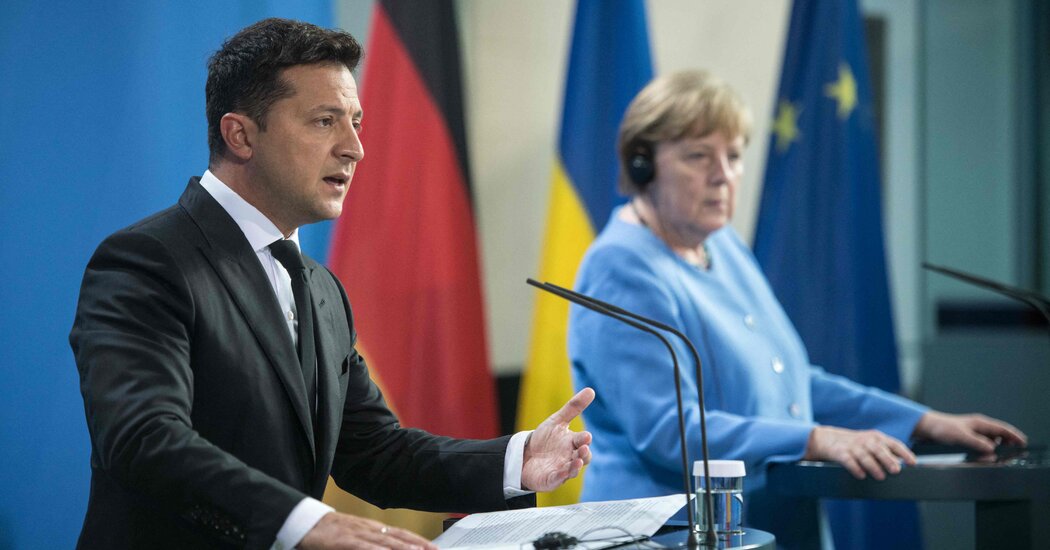
BRUSSELS — President Volodymyr Zelensky of Ukraine lambasted the former leaders of Germany and France, Angela Merkel and Nicolas Sarkozy, in a video address released late on Sunday, seemingly blaming them for the deaths of Ukrainian civilians.
“I invite Ms. Merkel and Mr. Sarkozy to visit Bucha, to see what the policy of 14 years of concessions to Russia has led to,” Mr. Zelensky said, referring to the Kyiv suburb where images surfaced over the weekend of bodies lying in the streets after Russian forces withdrew. “See with your own eyes the tortured and slain Ukrainians.”
Mr. Zelensky was speaking, he said, on the 14th anniversary of the 2008 NATO summit in Bucharest, Romania, where, after a major internal debate, NATO promised membership in the alliance to Georgia and Ukraine but without specifying when.
He blamed NATO country politicians for harboring an “absurd fear” of Russia, adding: “They thought that by refusing Ukraine, they could appease Russia, to convince it to respect Ukraine and live normally alongside us.”
Later, he insisted that he did not blame the West or anyone else except the Russian soldiers who he said committed crimes against Ukrainians and those who gave them their orders. “But we have the right to talk about indecision,” he said.
The Bucharest summit was marked by a debate over whether to give Ukraine and Georgia a formal “membership action plan” to guide them toward qualifying for NATO membership. President George W. Bush favored doing so. Ms. Merkel and Mr. Sarkozy were not alone in arguing that neither country was ready, and that to extend membership plans to them would severely hurt relations with Russia and President Vladimir V. Putin.
Mr. Bush’s defense secretary, Robert M. Gates, told him that offering Georgia and Ukraine NATO membership “was truly overreaching” and, according to his memoir, a case of “recklessly ignoring what the Russians considered their own vital national interests.”
Mr. Putin made the same point in Bucharest, saying that Ukraine and Georgia joining NATO were red lines for him.
In a late-night compromise, all NATO member states agreed that the two countries should not be offered a membership action plan, but were promised membership at some point in the future.
Fiona Hill, a Russia scholar who was then a U.S. government intelligence analyst, said that the intelligence community tried to persuade Mr. Bush not to make that promise, but failed. Four months later, Russia went to war in Georgia. As for Ukraine, Ms. Hill said, Mr. Putin “has been trying to shut that door ever since.”
Russia-Ukraine War: Key Developments
U.N. meeting. President Volodymyr Zelensky of Ukraine addressed the United Nations Security Council, detailing the horrors he saw in Bucha, the Kyiv suburb where Russian troops have been accused of killing civilians, and laying out a powerful indictment of the U.N.’s failure to prevent the invasion.
Even after Russia annexed Crimea in 2014 and helped sponsor separatist rebels in the eastern regions of Donetsk and Luhansk, NATO made no effort to bring Ukraine into line for membership. NATO countries helped Ukraine train and equip its army, and provided significant economic and political support, but without membership, the country remained unprotected by the alliance’s commitment to collective defense — leaving it in a “gray zone,” Mr. Zelensky said on Sunday.
Ms. Merkel responded on Monday through a spokeswoman, who said that she stood “by her decisions in connection with the 2008 NATO summit in Bucharest.”
But Ms. Merkel also supported the efforts “to stand by Ukraine and to put an end to the barbarism and the war by Russia against Ukraine,” the spokeswoman added.
Mr. Sarkozy had no immediate comment. But Germany and France — and NATO as a whole — have made it clear even during this war that they have no interest in fighting a nuclear-armed Russia on behalf of Ukraine. Both countries, along with other NATO allies, have given Ukraine the weapons and other support that Mr. Zelensky has used to try to beat back the Russian invasion.




